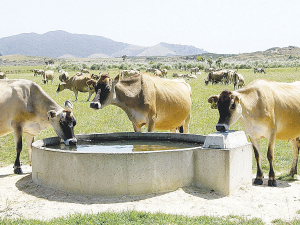Ensuring your cows have the best mating this season
Hit the ground running this mating with these foundations for success.
 Animal health and welfare is a top priority as the dairy sector experiences dwindling magnesium supply.
Animal health and welfare is a top priority as the dairy sector experiences dwindling magnesium supply.
Dairy farmers are facing a tight supply of magnesium due to Covid-19 related shipping delays.
DairyNZ general manager farm performance Sharon Morrell says shipping woes have caused disruption for some magnesium supply into New Zealand.
Retailers of magnesium, DairyNZ, NZ Veterinary Association and Ministry for Primary Industries (MPI) have met to better understand the extent of the disruption.
Morrell says they are working together to ensure animal health and welfare needs can be addressed.
<p."Supplies of magnesium are tight across all suppliers across the country but there is a plan in place to manage critical animal health needs," she says. "A number of shipments are due this month, and we anticipate this will ease the supply situation."
Animal health and welfare is a top priority for everyone in this sector and farmers are being urged to continue talking to their retailers about theier specific needs.
Morrell is also urging farmers to manage their magnesium stocks well.
"Share any excess with others, talk to retailers about specific needs and check with your vet or farm consultant before implementing major changes to your normal plan, or if there are animal health issues on farm that are different to a usual season.
Tips to Manage Use
Pre-Calving
Post calving/p>
Horticulture New Zealand (HortNZ) has added its perspective to numerous primary sector voices urging the Government to strengthen its draft legislation to replace the Resource Management Act (RMA).
The Commerce Commission has finalised new information disclosure requirements for local councils and water organisations that deliver water supply and wastewater services.
Beef + Lamb NZ (B+LNZ) is calling for significant changes to the Government’s reforms to the Resource Management Act (RMA).
NZPork says the Government needs to strengthen its proposed planning laws to ensure New Zealand's pig farmers can continue to produce pork.
Good news for kiwifruit growers - a record crop with forecast per hectare returns at record levels for all fruit categories for the 2025-26 season.
As guests gathered on what is known as the Speaker's Lawn - a beautifully manicured patch of grass behind the main buildings of Parliament - to mingle and enjoy a lamb chop to celebrate National Lamb Day, the mood was very much upbeat.
OPINION: Staying with politics, with less than nine months to go before the general elections, there’s confusion in the Labour…
OPINION: Winston Peters' tirade against the free trade deal stitched with India may not be all political posturing by the…